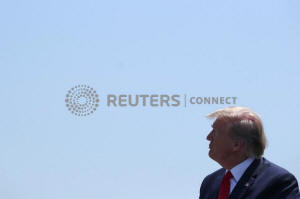U.S. to deny tariff relief for Apple Mac Pro parts from China: Trump
 Send a link to a friend
Send a link to a friend
 [July 27, 2019] By
David Shepardson and Susan Heavey [July 27, 2019] By
David Shepardson and Susan Heavey
WASHINGTON (Reuters) - U.S. President
Donald Trump on Friday said his administration would not grant Apple Inc
any relief for tariffs on parts made in China for its Mac Pro computer
and later added he thought the firm would build a plant in Texas.
"Apple will not be given Tariff waiver, or relief, for Mac Pro parts
that are made in China. Make them in the USA, no Tariffs!" Trump
tweeted.
On July 18, Apple asked the U.S. Trade Representative's office to waive
25% tariffs on 15 parts, including ones for the Mac Pro desktop
computer. The public comment period for those requests closes on Aug. 1.
Trump later told reporters he thought Apple would build a plant in
Texas, without elaborating on exactly what he was referring to or how he
knew.
"I want Apple to build their plants in the United States. I don't want
them to build them in China. So when I heard they were going to build it
in China, I said, 'No, that's OK, you can build it in China but when you
send your product into the United States we're going to tariff you," he
said.

"We'll work it out," he said. "I think they're going to announce that
they're going to build a plant in Texas. And if they do that, I'm
starting to get very happy."
The Wall Street Journal reported in June that Apple is shifting
manufacturing of its new Mac Pro desktop computer to China from Texas.
Apple issued a statement at the time that "like all of our products, the
new Mac Pro is designed and engineered in California and includes
components from several countries including the United States" and
emphasized that "final assembly is only one part of the manufacturing
process."
Representatives for Apple had no immediate comment on either the tariff
or Texas plant comments on Friday. Shares of the company sharply pared
their gains after the tweets.
Apple CEO Tim Cook in December 2013 announced the company was building
the Mac Pro in Texas after coming under criticism for assembling most of
its products in lower-wage countries.
Apple does not disclose sales figures for its Mac Pro, but analysts do
not believe it is a high-volume seller for the company compared to the
iPhone. Priced at $6,000 and up, it is aimed at professional users such
as movie and music studios.
[to top of second column] |

President Donald Trump participates in welcome ceremony for Defense
Secretary Mark Esper at the Pentagon in Arlington, Virginia, U.S.,
July 25, 2019. REUTERS/Jonathan Ernst/File Photo

Trump has previously made claims about Apple's plans to build new U.S.
plants, which have not materialized.
Apple did say in December it would build a second campus in Austin,
Texas. The company is also spending $390 million with supplier Finisar
Corp that helped the chipmaker re-open a 700,000-square-foot factory in
Texas.
TRADE WAR
Trump has levied billions of dollars in tariffs on Chinese imports and
threatened to impose levies on another $325 billion of Chinese goods if
no progress is reached in a trade dispute that has disrupted global
supply chains and shaken financial markets.
For Apple, China is both a key market and a major production center for
its devices. The company got nearly 18% of its total revenue from
Greater China in the quarter that ended in March.
Apple in June asked its major suppliers to assess the cost implications
of moving 15% to 30% of its production capacity from China to Southeast
Asia, according to a Nikkei report.
In its submissions to the U.S. Trade Representative asking for the
waivers, Apple said the products were part of a consumer electronic
device and "not strategically important or related to Chinese industrial
programs, such as "Made in China 2020."
The parts include graphics processing modules, structural frames, power
supply units, AC power cables, ladder assemblies, data cables and a
wireless mouse line.
Some Apple products such as the Apple Watch and AirPods headphones faced
a potential 25% tariff last year, but officials spared Apple and other
electronics makers such as Fitbit Inc in September.
The Trump administration has denied numerous other tariff exclusion
requests from major companies including General Motors Co for its
Chinese-made Buick Envision, Tesla Inc for components for its electric
vehicles and Uber Technologies Inc for electric bikes.

(Reporting by Susan Heavey and David Shepardson; Additional reporting by
David Alexander and Stephen Nellis; editing by Jonathan Oatis, Bill
Trott and Sonya Hepinstall)
[© 2019 Thomson Reuters. All rights
reserved.] Copyright 2019 Reuters. All rights reserved. This material may not be published,
broadcast, rewritten or redistributed.
Thompson Reuters is solely responsible for this content. |